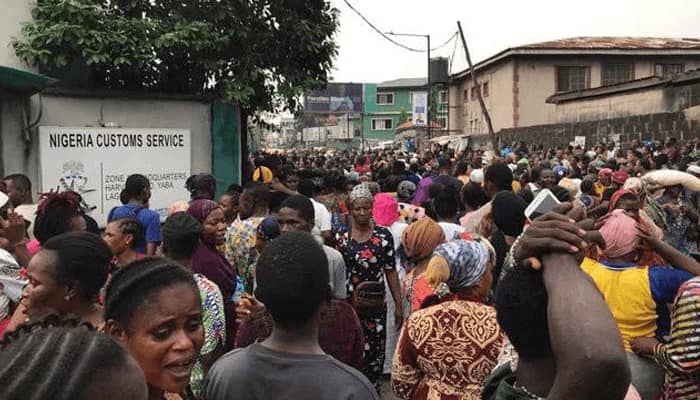CBN Governor Sanusi Lamido Falls Out With President Jonathan Over Multi-Billion Naira Fraud

 There is a saying that someone who is being targeted for beating ought not walk in deserted places, but the reverse has been the case with the current governor of the Central Bank of Nigeria, Mr. Sanusi Lamido, who has garnered so many enemies over the years through his actions and inactions; and these enemies are dying to see his achievements as CBN governor go up in flames. The man who had for some time been mentioned in many controversial issues, we gathered, may have finally landed himself in serious trouble if the report coming out of the International Center for Investigative Reporting ICIR is anything to go by.
There is a saying that someone who is being targeted for beating ought not walk in deserted places, but the reverse has been the case with the current governor of the Central Bank of Nigeria, Mr. Sanusi Lamido, who has garnered so many enemies over the years through his actions and inactions; and these enemies are dying to see his achievements as CBN governor go up in flames. The man who had for some time been mentioned in many controversial issues, we gathered, may have finally landed himself in serious trouble if the report coming out of the International Center for Investigative Reporting ICIR is anything to go by.
Despite his excesses the CBN governor has always had the support of the president but recently in a move that has surprised many, President Goodluck Jonathan queried the CBN boss over various infractions detected in the apex bank’s 2012 audited account.
The query, which covered 22 issues bordering on massive fraud at the bank, was sent to the governor on May 6, and the response, though expected back on May 8, was submitted to the President on May 21.
The query raised on the bank’s account, which its auditors, Ernst and Young, an international auditing firm, passed without officially signing, with only a comment that it complied with the CBN Act, and also issues on different financial improprieties such as investment of a huge amount of money in an Islamic bank in Malaysia without any guarantee of its generating returns.
The query also raised questions on other spending such as the write-off of about N3.5 billion CBN staff housing loan and the donation of about one billion naira to a political party to open up offices across the country. This donation, which was given under the special access item in the account, is believed to be geared towards furthering Sanusi’s alleged political ambition in the 2015 general elections.
It also touched on other issues such as refusal of the apex bank to consolidate in its account, the trillion debt owed by the Asset Management Company, AMCON, and the non-disclosure of the total liabilities through the bond floated by the company.
The governor was also asked to explain the discrepancies noted in the 2012 account regarding the Nigerian Security Printing and Minting Company, a subsidiary of the apex bank.
Other issues included the controversial donations made to some higher institutions in the country. Investigations have shown that some of the donations were inflated in the bank’s books. For example, while the Bayero University Kano, BUK, was said to have collected N4billion, the school authorities claimed it got only N1billion.
The apex bank’s account became suspicious when the governor refused to submit it to the Financial Reporting Council, FRC, the body with the mandate to ascertain the compliance of companies with accounting standards, and the International Financial Reporting Standards, IFRS. Rather than submitting it to the body, the governor requested for seven years’ grace for the CBN to comply with FRC stipulations.
The audit report of the account, which was submitted directly to the president, was later forwarded to the economic adviser to the president for his appraisal. The official okayed the account and noted that it complied with the CBN Act.
However, unhappy with the economic adviser’s comment, President Jonathan was said to have returned the report to him and drew his attention to the refusal of the auditor to sign the account.
It should be known that this is not the first time the CBN account will be open to scrutiny under Sanusi but the bank has always hidden under its autonomy to stave off close inspection. The apex bank is on the first line charge and receives its appropriation directly from the federation account and exercises enormous financial autonomy.
This is the reason in May this year that the public accounts committee of the House of Representatives also had cause to query several expenditure items amounting to N4.7 billion in the CBN accounts. This included the N2.8 billion which the bank said it spent on the construction of its Port Harcourt branch.
The House in turn had worked with a report from the office of the auditor general of the federation which queried extravagant expenditure by the apex bank for which documents were not made available for verification.
Chairman of the House Committee on Public Accounts, Solomon Olamilekan at a meeting with officials of the bank alleged that there were indications that due process was not followed in expenditure as no documents were provided. Some of the bank transactions that the committee queried included the sums of N23 million and N50 million claimed to have been spent for the same purpose of renovating the governor’s official residence as well as N848 million spent on the purchase of a property from the National Planning Commission without any transaction agreement. However, like many probes of public institutions by the National Assembly, the matter appears not to have been pursued.
The N4 billion donation to BUK questioned in the president’s query had not even been known to the public. What had irked many Nigerians, including federal lawmakers, was the donation earlier in the year of N100 million to victims of terrorism in Kano, Sanusi’s hometown at a time when flood victims in the country are finding it hard to raise money and this to many Nigerians means that the CBN is being run by Sanusi as if it’s a personal business.
When the House of Representatives entertained a motion on misuse of public funds on the donation which degenerated into a rowdy session with many members accusing Sanusi of misuse of public funds, during the period a House of Representatives member from Yobe State, Goni Lawan, described Sanusi’s donation of N100 million to Kano State and another N25m gift to Madalla bomb blast victims as “an act of terrorism”, arguing that attacks in Yobe and Borno states did not attract the same monetary consolations from the CBN governor.
According to him, “When I first heard of the action of the CBN governor I was surprised. I asked whether Yobe and Borno states were not parts of Nigeria, as these attacks took place there first.”
Attempts to get the apex bank to react our story were unsuccessful. Over a week ago, when our reporter contacted the corporate affairs director of the CBN, Ugochukwu Okoroafor, and confronted him with the various issues noted in the CBN 2012 audited account, he claimed ignorance of any presidential query to the governor. “I don’t know what donation you are talking about. Was it done in cash? I’m not aware of the things you are saying. If you can provide me with this document that would help, because I haven’t seen it,” he said.
Okoroafor said he was out of town on an official assignment in Abia State and would not be back soon, while the mail asking him to respond to specific allegations about a write-off of about N3.5 billion CBN staff housing loan, donation of about N1 billion to a political party to open up offices across the country as well as the donation of N4 billion to the Bayero University Kano, among others, has not been replied.
Courtesy: International Centre for Investigative Reporting ICIR.



